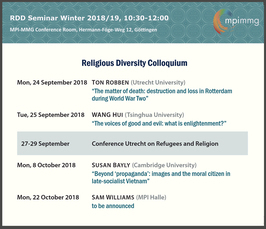"The voices of good and evil: what is enlightenment?"
Religious Diversity Colloquium Winter 2018/19
- Date: Sep 25, 2018
- Time: 10:30 AM - 12:00 PM (Local Time Germany)
- Speaker: WANG Hui (Tsinghua University=
- Wang Hui, Distinguished Professor of literature and history at Tsinghua University, Changjiang Scholar, Director of Tsinghua Institute for Advanced Study in Humanities and Social Sciences. He achieved his Ph.D in 1988 at Chinese Academy of Social Sciences. From 1996 to 2007, he served as the co-editor of Dushu magazine and organized a series of significant intellectual debates in China. In 2002, he moved to Tsinghua University. His fields are Chinese intellectual history, modern Chinese literature and social theory etc. His publications include The Rise of Modern Chinese Thought (four volumes), The Depolitized Politics, “Tibetan Question” between East and West, From Asian Perspective: Narrations of Chinese History, The Short Twentieth Century: Chinese Revolution and the Logic of Politics tc. Many of his works have been translated into different languages including China’s New Order, The End of the Revolution, The Politics of Imagining Asia and China from Empire to Nation-State: China’s Twentieth Century etc. He is the winner of “2013 Luca Pacioli Prize” and “2018 Anneliese Maier Research Award”.
- Location: MPI-MMG, Hermann-Föge-Weg 12, Göttingen
- Room: Conference Room

For more details please contact vdvoffice(at)mmg.mpg.de.
Wang Hui’s essay explaining “Toward a Refutation of Malevolent Voices,” Lu Xun’s dense 1908 meditation on the cultural dilemmas China could no longer put off facing, is the first work to offer a comprehensive reading of this important text. Discussing the treatise in deep historical context. Wang begins by addressing the convoluted archaic language that Lu Xun chose for his writing, demonstrating that this choice represented the writer’s protest against the calcification that he saw as having come to characterize all registers of Chinese written expression by the end of the nineteenth century. While the turn to the vernacular has generally been seen as the sine qua non of the expansion of popular knowledge in modern China, Wang Hui finds Lu Xun arguing that any abandonment of deeply rooted indigenous linguistic form would result in China merely pursuing an elite-driven rationality at the expense of allowing it to develop its own particular subjective agency. Wang Hui also takes on perhaps the most controversial aspect of Lu Xun’s essay—the defense of popular “superstition” against the attempts to suppress it by what he referred to as the “hypocritical gentry.”